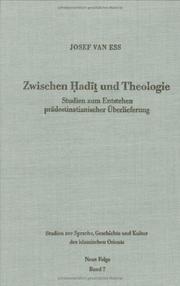| Listing 1 - 7 of 7 |
Sort by
|
Book
ISBN: 2874640174 9782874640179 Year: 2006 Publisher: Bruxelles Al-Fajr
Abstract | Keywords | Export | Availability | Bookmark
 Loading...
Loading...Choose an application
- Reference Manager
- EndNote
- RefWorks (Direct export to RefWorks)
Book
ISBN: 3110842459 Year: 2016 Publisher: Berlin ; Boston : De Gruyter,
Abstract | Keywords | Export | Availability | Bookmark
 Loading...
Loading...Choose an application
- Reference Manager
- EndNote
- RefWorks (Direct export to RefWorks)
Book
Year: 1948 Publisher: London Luzac
Abstract | Keywords | Export | Availability | Bookmark
 Loading...
Loading...Choose an application
- Reference Manager
- EndNote
- RefWorks (Direct export to RefWorks)
Free will and determinism --- Predestination (Islam) --- Religious aspects --- Islam
Book
Year: 1948 Publisher: London : Luzac,
Abstract | Keywords | Export | Availability | Bookmark
 Loading...
Loading...Choose an application
- Reference Manager
- EndNote
- RefWorks (Direct export to RefWorks)
Free will and determinism --- Predestination (Islam) --- Prédestination (Islam) --- Religious aspects --- Islam
Book
ISSN: 01531018 ISBN: 2862180092 9782862180090 Year: 1978 Volume: 3 Publisher: Paris : Sindbad,
Abstract | Keywords | Export | Availability | Bookmark
 Loading...
Loading...Choose an application
- Reference Manager
- EndNote
- RefWorks (Direct export to RefWorks)
Predestination (Islam) --- Free will and determinism (Islam) --- Prédestination (Islam) --- Libre arbitre et déterminisme (Islam) --- Free will and determinism --- Religious aspects --- Islam --- Islam. --- Predestination (Islam). --- Prédestination (Islam) --- Libre arbitre et déterminisme (Islam) --- Compatibilism --- Determinism and free will --- Determinism and indeterminism --- Free agency --- Freedom and determinism --- Freedom of the will --- Indeterminism --- Liberty of the will --- Determinism (Philosophy) --- Religious aspects&delete& --- Doctrines --- Free will and determinism - Religious aspects - Islam

ISBN: 3110042908 9783110042900 Year: 1975 Volume: 7 Publisher: Berlin de Gruyter
Abstract | Keywords | Export | Availability | Bookmark
 Loading...
Loading...Choose an application
- Reference Manager
- EndNote
- RefWorks (Direct export to RefWorks)
Hadith --- Predestination (Islam) --- 297.1 --- Free will and determinism --- Islam --- Tradition (Islam) --- Islamic law --- Islamic literature --- Sunna --- Islam:--religieuze vraagstukken : indelen zoals 291.1/.8 --- Religious aspects --- Doctrines --- Hadith. --- 297.1 Islam:--religieuze vraagstukken : indelen zoals 291.1/.8 --- Predestination (Islam).
Book
ISBN: 9780415662185 9781315858548 9781317937029 9781317937036 9781138242746 1138242748 Year: 2014 Publisher: London : Routledge,
Abstract | Keywords | Export | Availability | Bookmark
 Loading...
Loading...Choose an application
- Reference Manager
- EndNote
- RefWorks (Direct export to RefWorks)
"The subject of "human free-will" versus "divine predestination" is one of the most contentious topics in classical Islamic thought. By focusing on a theme of central importance to any philosophy of religion, and to Islam in particular, this book offers a critical study of the intellectual contributions offered to this discourse by three key medieval Islamic thinkers: Avicenna, Ghāzālī and Ibn Arabī. Through investigation of primary sources, Free Will and Predestination in Islamic Thought establishes the historical, political and intellectual circumstances which prompted Avicenna, Ghāzālī and Ibn Arabī attempts at harmonization. By analysing the theoretical and linguistic 'techniques' which were employed to convey these endeavours, this book demonstrates that the three individuals were committed to compromise between philosophical, theological and mystical outlooks. Arguing that the three scholars' treatments of the so-called qaḍaʼ wa'l-qadar (decree and destiny) and ikhtiyar(free-will) issues were innovative, influential and fundamentally more complex than hitherto recognized, this book contributes to a fuller understanding of Islamic intellectual history and culture and will be useful to researchers interested in Islamic Studies, Religion and Islamic Mysticism"-- "The subject of "human free will" versus "divine predestination" is one of the most contentious topics in classical Islamic thought. By focusing on a theme of central importance to any philosophy of religion, and to Islam in particular, this book offers a critical study of the intellectual imports offered to this discourse by three key medieval Islamic scholars: Avicenna, Ghāzālī and Ibn Arabī"--
Free will and determinism --- Predestination (Islam) --- Religious aspects --- Islam. --- Avicenna, --- Ġazālī, Muḥammad ibn Muḥammad Abū Ḥāmid al --- -Ibn al-ʻArabī, --- Islamic philosophy --- Islam --- 297.12 --- Mohammedanism --- Muhammadanism --- Muslimism --- Mussulmanism --- Religions --- Muslims --- Compatibilism --- Determinism and free will --- Determinism and indeterminism --- Free agency --- Freedom and determinism --- Freedom of the will --- Indeterminism --- Liberty of the will --- Determinism (Philosophy) --- 297.12 Islam: theologie; doctrine --- Islam: theologie; doctrine --- Religious aspects&delete& --- History --- Doctrines&delete& --- Doctrines --- Free will and determinism (Islam) --- Free will and determinism - Religious aspects - Islam --- Islam - Doctrines - History --- Islamic philosophy - History --- Ġazālī, Muḥammad ibn Muḥammad Abū Ḥāmid al
| Listing 1 - 7 of 7 |
Sort by
|

 Search
Search Feedback
Feedback About UniCat
About UniCat  Help
Help News
News